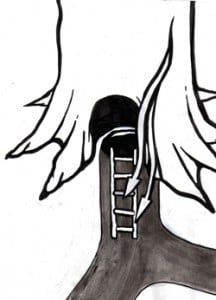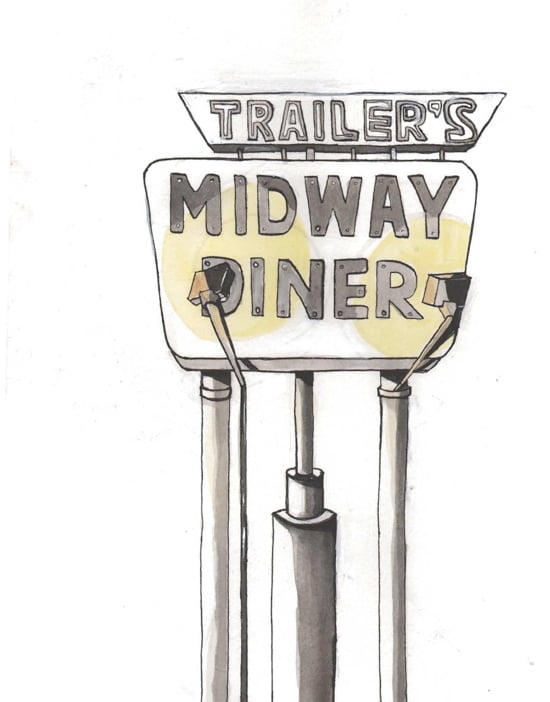Linda (15)
By:
September 29, 2011
HILOBROW is proud to present the fifteenth installment of Karinne Keithley Syers’s novella and song cycle Linda, a hollow-earth retirement adventure with illustrations by Rascal Jace Smith. New installments appear every Thursday.

The story so far: Linda has been traveling across a dust covered America. She’s been to Chicago, New York City, Niagara Falls, and recently been meandering through Pennsylvania, watching old reels in old movie theaters. She is making her way slowly west, unaware of the preparations of the earth’s crust beneath her. In the last installment she discovered some of the detritus blown through periodic spoutholes by the tunneling work, particularly an essay on a particular kind of blue.
27.
Linda reads and rereads the essay. It is exactly two pages. She turns to look at the sky and imposes upon it this blue across the grey, enforces for a few seconds a pure expanse of color. Then the grey returns. She tries again, and again the color holds for a few seconds, and then drains. Again she tries, but this time committed not to the intensity of the work of the imposition but its simplicity. Baby simple, Leonard Bernstein, she says, and effortlessly the sky fills in, as if by an illustrator’s hand, a flat plane of blue in a single click of mind. In the foreground the buildings, in the mid-ground the hills and behind them flat color. “Stay,” she says to the color. She gets in the van and drives. She turns on the radio and finds a solitary channel amidst the static, from which the first slow notes of Shostakovich’s 15th string quartet emerge, plotting careful paths, multiplying into four parts without condensing the space between them, like so many spider lines suspended along the highway. Linda’s breathing slows. Behind her, dust spews in perfect curls away from the car tires. This is her time to take in the skyness of sky. I feel wide, she thinks to herself. The thought is recursive but not obsessive, return in a slow, ample period every few miles. I feel wide. This width is a sensation like a softening in the back space of her body, a diffusion of everything compact and tense in her. A sense that she is not pushing but floating through the landscape. That the landscape is for her. That this blue is for her. She drives on, through Pennsylvania. Drives through Amish country, which is for her.
The quartet seems to last forever, but when it ends the radio is again eclipsed by static, so she puts in a tape labeled “American Musics” which I have put in the van, a tape that belongs to this particular Pennsylvania highway. The thin, drawn languor of a song emerges, the voices of Bob Dylan and Emmylou Harris here pulled so tightly together it is as if they reach their respective frequencies only by falling out from a place where they are pinned against each other back to back, facing out from the same spine. You should listen too.
The color holds its flatness but darkens along a printer’s curve. The air settles lower. Linda sings. Your breath is sweet, your eyes are like two jewels in the sky. Your back is straight your hair is smooth on the pillow where you lie. But I don’t sense affection, no gratitude or love. Your loyalty is not to me, but to the stars above. One more cup of coffee for the road. One more cup of coffee ‘fore I go. To the valley below.
Along the road Linda sees the occasional farmhouse, and every now and then a billboard advertising souvenir shops, sheepskin clothes, famous Dutch sausage, but mostly just she sees fields that slope quickly into hills on either side. What light comes from the buildings is only the blue that hits the windows, travels through the windows to mirrors above doorways and mirrors rising up from dressers, which bounce the light back to Linda’s eye. There is no visible sun, but the wide flat color darkens gradually, until it reaches a rich full blue, and within it, in the distance, appears a tiny red glow, fuzzy in her eye, growing slowly larger. As she nears, the glow becomes legible as sign while the blue turns from full to inky and moves toward black. The Midway diner announces itself, yellow neon letters on a red field, single item now visible beyond the range of the van’s headlights. Linda pulls off the road, past the abandoned gas station, and parks in front of lighted windows of the diner. She enters and the single waitress at the counter looks up and says, “anywhere you want.” The Carter Family sings from a radio in the kitchen. “I just have to use the ladies room first,” says Linda, and she makes her way around the counter to the fake wood paneled back room and through the small door marked with the outline of a dress, pees, and then returns and takes a place at the counter, a few seats down from where the waitress leans, drawing on a napkin.
“Coffee?” asks the waitress and Linda nods yes. She shouldn’t drink coffee with the state of her stomach but there is a pot on and it smells fresh enough and anyway it is for her. The waitress pushes a roll of antacids toward her, and points to the specials on the board. There is a single item listed, vegetable soup. “I’ll have the soup, please,” says Linda. “Cup or Bowl?” “Bowl. And some bread.” The waitress leaves for the kitchen and returns a minute later with the soup. Linda eats.
Linda asks the waitress’s name and she answers, “Linda.”
“That’s my name, too.”
“You don’t say.” The waitress seems unimpressed by the coincidence.
“What are you reading?” asks Linda (our Linda). The waitress turns the book over and reads its cover. “Personal Narrative of a Journey to the Equinoctial Regions of the New Continent, by Alexander von Humboldt.”
“Is it good?”
“Yes.”
“I’ve never heard of it.”
“It’s old.”
They breathe. They watch each other. Linda, our Linda, eats the rest of her soup, and then the buttered bread. When she is done, the waitress goes to the rotating pie stand and removes the single pie, cutting two slices, which she tops with whipped cream and brings over to Linda. Pulling up a stool she sits across the counter.
“So you didn’t feel like sleeping?” asks Linda (our Linda). The waitress nods. “I don’t sleep much,” she says. Outside the light is gone completely. “Sometimes I fall asleep without knowing it,” continues Linda (the waitress Linda), “and when I wake up I’m in a room that looks like my grandmother’s TV room, usually on the couch but sometimes in an armchair. There’s nowhere to go – it’s not really her house, just looks like her house. So I sleep while I’m there. Then a door opens onto the kitchen and if I walk through it I find myself here.”
“Do you ever see a dog?” asks Linda. The waitress Linda looks at our Linda for a while as if gauging her capacity, for secrecy or perhaps for calm. Refills Linda’s coffee. “A midget – a little person,” she finally says. “Sometimes there’s a little person working in the kitchen.” “A man or woman little person?” asks our Linda. “Man. It’s a little man from the movies, you would probably recognize him.”
“Does he talk to you?”
“He sings.”
“Oh.”
“Is he here?”
“Now? No.”
“What does he sing?”
Waitress Linda looks at Linda sharply.
(One of the only celebrities I ever saw was one of the actors from Time Bandits’ gang of time traveling dwarves. It was 1982 or 83 and my family was on a trip to London from where we lived in Yorkshire. We were, I think, at the movies, and not the theater, but there were intermissions for refreshments generally then. “Wouldn’t you like a nice King Cone?” the announcer’s voice would ask to double swirling images of chocolate and nut encrusted ice cream. In our home theater someone would come down the aisle with a tray but here in London we walked out into red-walled balcony level concessions stands and stood in line, which was where we saw the actor from Time Bandits, no taller than me, but glorious.)
A sound erupts from the ground outside, a motor sound. The van has turned on by itself. “There’s no one else until you reach California,” says the waitress to Linda. She hands her the bill for $5.60. “You need to drive to California.” She reaches under the counter and pulls out a bag of sandwiches and hands them to her. “You have a cooler?” “Yes.” “Good.”
Linda puts the money on the counter, takes the bag, and walks to the door. She turns around and standing next to waitress Linda is the little man. “You’ll be alright?” asks our Linda. The waitress nods. “I’m not staying,” she says.
Linda walks outside to the van, climbs up into it. She is parked in front of the windows, and from the driver’s seat, directly faces the counter. The little man has climbed up on the counter, the waitress holds a cutout of a volcano, and both stare out at Linda. Through the proscenium of the windowframe Linda nods at them, and they begin singing, and although she cannot hear what they sing, just the the way they eyes half shutter and their throats strain is incredibly moving to Linda. Waitress Linda operates a system of paper wheels and the black silhouette of mountain sprouts vegetation. The little man operates a small puppet, a figure of a mountaineer, whom he takes carefully up the side of the mountain. When the puppet reaches the top, they stop singing. Waitress Linda takes out a small set of handbells and rings them with the expertise of long hours of church choir. Although the sound is still muted, Linda feels the bells vibrating her gut. The little man drops the puppet into the volcano, then cranks it open to reveal a blue-green interior, not blue-green like the earth from space but blue-green like fish scales.
They stop moving and look out at Linda, then the light from the diner’s neon sign buzzes, brightens, and cuts out. Linda turns on her headlights, then turns them off. Dawn light, she thinks, and the sky turns a light pink. Nothing is visible inside the diner. Linda reverses, returns through the parking lot, and regains the highway.
http://www.youtube.com/watch?v=Kz6o9wCNxbc
And now, listen to the next song in the Linda song cycle, blue:
NEXT WEEK: O California, O Radio Man. Stay tuned!
Karinne and HiLobrow thank this project’s Kickstarter backers.
READ our previous serialized novel, James Parker’s The Ballad of Cocky The Fox.
READ MORE original fiction published by HiLobrow.

